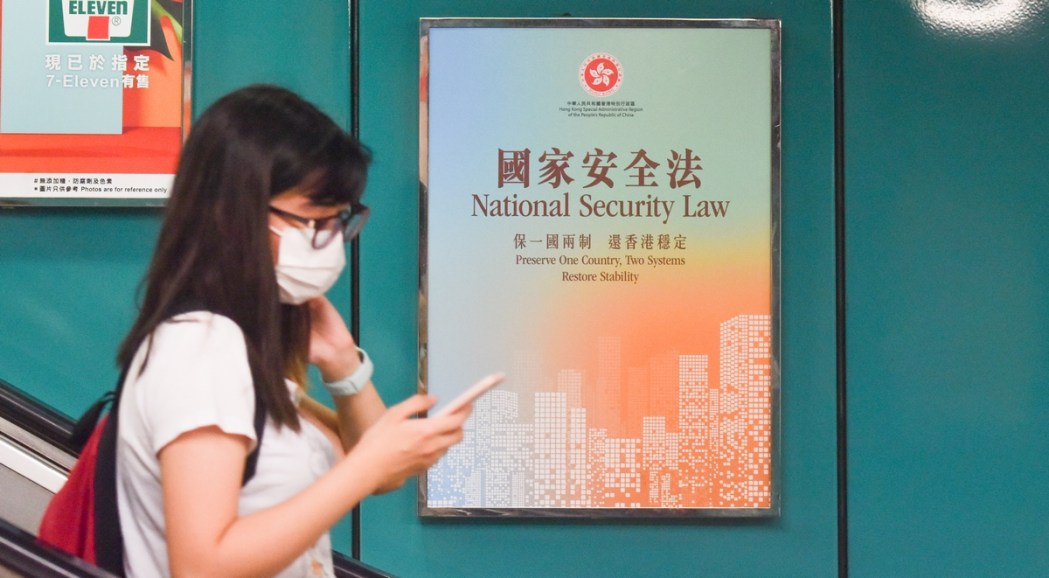A Hong Kong pro-establishment party has staged a protest outside the US consulate to decry American politicians urging sanctions on those involved in the city’s judicial system over alleged human rights violations.

Led by Hong Kong Federation of Trade Unions lawmaker Joephy Chan, around 20 people gathered on Garden Road in Central on Monday morning.
“Oppose the US intervening in Hong Kong’s affairs,” they chanted in Cantonese. “Strongly condemn the US influencing Hong Kong’s judicial independence.”
The protest came after a bipartisan group of US lawmakers introduced a bill last week to sanction 49 Hong Kong judges, prosecutors and government officials, with the intention of holding those named accountable for alleged rights violations, as well as to “stand with Hongkongers facing scrutiny” under the national security law.
Called the Hong Kong Sanctions Act, if passed, the new bill would require the US president to decide if the named individuals had violated human rights and if sanctions should be imposed.
Outside the US consulate on Monday, Chan said the party did not fear US actions.
“We will not be afraid of US politicians introducing so-called sanctions in an attempt to affect us,” Chan said. “The FTU, as staunch patriots, will definitely take a stand and protect the country’s dignity and national security.”

She added that the party had been unable to arrange for any representatives of the US consulate to receive their petition letter.
“[The US] says there is freedom of expression, but they are unwilling to listen to our views,” Chan said.
In a statement on Sunday, the Hong Kong’s national security committee expressed “strong indignation” at the proposed sanctions.
“Any attempt to interfere is unpopular and doomed to fail,” the committee wrote in a statement on Sunday, adding that the politicians were ill-intentioned and “unwilling to see” the “reality” of life in Hong Kong under the security law.
The committee said the Beijing-imposed legislation had restored stability to Hong Kong since the “chaos” in 2019 saw calls for independence, secession and “terrorist violence.” While the government has accused protesters of supporting independence during the anti-extradition unrest, independence was not one of the main demands.

“Citizens have returned to normal life and the vibrant business environment has been restored,” the statement read.
‘Similar to triads’
The US politicians’ bill, if passed, would require the White House to decide within six months whether to sanction the officials under existing legislation, including the Global Magnitsky Human Rights Accountability Act and Hong Kong Human Rights and Democracy act.
The 49 names included Secretary for Justice Paul Lam, the Secretary General of the the city’s Committee for Safeguarding National Security Sonny Au, and Police Commissioner Raymond Siu.
Also named were those involved in the high-profile 47 democrats’ national security proceedings, among them the government prosecutors Anthony Chau, Jonathan Man and Andy Lo, as well as judges Andrew Chan, Alex Lee and Johnny Chan.
The US first slapped sanctions on Hong Kong officials in 2020, after the national security law came into force following months of protests and unrest against a controversial extradition bill. The demonstrations grew into wider opposition against the Hong Kong and Beijing governments.
It criminalised subversion, secession, collusion with foreign forces and terrorist acts – broadly defined to include disruption to transport and other infrastructure. The move gave police sweeping new powers, led to hundreds of convictions amid new legal precedents, whilst dozens of civil society groups disappeared. The authorities say it restored stability and peace to the city, rejecting criticism from trade partners, the UN and NGOs, despite an overall rise in crime.

Then-chief executive Carrie Lam, justice secretary Teresa Cheng and security chief John Lee were among those targetted. Under the sanctions, the officials’ properties and interests in the US were effectively frozen.
Secretary for Security Chris Tang, who was also sanctioned in 2020, said the US lawmakers’ moves were “similar to triad members.”
“Charging people under Hong Kong laws for breaching Hong Kong laws is a matter of course,” he said.
“These overseas politicians [are threatening sanctions] maybe because of their own interests, or to protect their lackeys in Hong Kong,” he added. “This is similar to what Hong Kong triad members or overseas gangs would do.”
“Charging people under Hong Kong laws for breaching Hong Kong laws is a matter of course,” he said.
Support HKFP | Policies & Ethics | Error/typo? | Contact Us | Newsletter | Transparency & Annual Report | Apps
Help safeguard press freedom & keep HKFP free for all readers by supporting our team
























